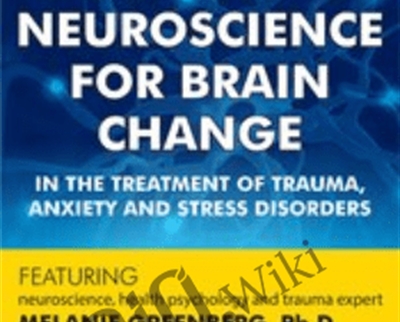2-Day Applied Neuroscience for Brain Change in the Treatment of Trauma, Anxiety and Stress Disorders – Melanie Greenberg
$116.00
12 Hours 11 Minutes
Advances in neuroscience and health psychology, positive psychology, and mindful self-compassion provide us with new tools to energize, strengthen, and update our approach to therapy.
Description
Purchase 2-Day Applied Neuroscience for Brain Change in the Treatment of Trauma, Anxiety and Stress Disorders – Melanie Greenberg Course at eBokly. We actively participate in group buys and are committed to sharing knowledge with a wider audience. What's more, our courses maintain the same quality as the original sale page. You have the option to buy directly from the sale page at the full price (sale page link is provided within the post).
This certificate training program will help you master applying neuroscience in your clinical practice – transforming clients' lives and improving your clinical skills.
Few trainings can offer you the following taught by skilled trainer and clinician, Melanie Greenberg, PhD:
- Apply proven brain-based and mindfulness strategies for treating anxiety, GAD, depression, PTSD and help clients handle major life events and chronic stressors
- Teach clients stress resilience skills like positive focus, growth mindset, engaging mind and body, and mental toughness
- Motivate clients and calm the brain's stress response using the power of neuroplasticity
- Increase client engagement by focusing on changing the brain not just reducing symptoms
Advances in neuroscience and health psychology, positive psychology, and mindful self-compassion provide us with new tools to energize, strengthen, and update our approach to therapy.
Melanie began incorporating these brain- and strengths-based techniques 5 years ago and they have transformed her practice – making therapy more dynamic and interesting and creating more hopeful, engaged, and empowered clients.
When clients understand that they can actually rewire their brains by practicing new ways of thinking and behaving, they feel less stigmatized and stuck and more motivated to tolerate discomfort in order to change. With these new techniques, we can help clients overcome helplessness, avoidance, and rigid negative self-views and instead develop a growth mindset that helps them overcome the constraints of the past and rebuild their inner and outer worlds for increased happiness and success.
- Determine the neurophysiology of the stress response, including the roles of the amygdala, hypothalamus, sympathetic and parasympathetic nervous systems, and the effects of cortisol and adrenaline.
- Discriminate among acute stress, major life events and chronic stressors, and the longer-term effects of chronic stress on mind and body.
- Implement grounding strategies to help clients who experience “freeze” states or dissociative symptoms.
- Communicate the concept of mindfulness, how it affects the brain, and how to use mindfulness-based interventions in therapy.
- Critique the concept of self-compassion and research on its benefits.
- Design practical exercises to increase self-compassion in clients facing stress.
- Analyze the importance of perceived control to the impact of stressors and learn how to help clients differentiate controllable and uncontrollable aspects of stressors.
- Explore how stress and anxiety narrow cognitive focus and create thinking traps and learn techniques to help clients be more cognitively flexible in the face of stress.
- Evaluate the research suggesting that positive emotions can undo the physiological effects of negative emotions.
- Investigate how rumination exacerbates the effects of stress and how to help clients curtail ruminative cycles and de-fuse from negative thinking.
- Appraise how a growth mindset differs from a fixed mindset and how to help clients adopt a growth mindset and a gritty attitude towards their stressors.
- Assess the application of a brain-based, neuroscience approach to treating clinical disorders like GAD and PTSD.
Get 2-Day Applied Neuroscience for Brain Change in the Treatment of Trauma, Anxiety and Stress Disorders of author Melanie Greenberg only price 119$
Using Neuroscience in Treatment of Stress and Trauma
- Positives:
- Science gives authority, evidence, de-stigmatizes mental health problems
- Increased motivation and hope for change
- Concerns:
- Oversimplification, unrealistic expectations, changing state of science, see self as damaged or different
The Promise of Neuroplasticity
- Describe neuroplasticity in everyday language
- Therapy is about creating a new, more resilient brain
- We are changing beings – don’t have to be stuck in rigid views of self
- Teach brain to be less reactive to stress and triggers
- “Rewiring” as a metaphor for change
- Changing “raw,” unprocessed memories to organized narratives
The Brain’s Stress Response
- Historical view – Hans Selye
- The brain’s stress response “fight, flight, freeze”
- The triune brain – reptilian, mammalian, human
- The amygdala and the prefrontal cortex
- How the amygdala “hijacks” the brain into emergency mode
How the Stress Response is Spread Throughout the Body
- Neurotransmitters – Epinephrine, norepinephrine and cortisol
- The HPA axis and role of cortisol
- The sympathetic and parasympathetic nervous systems
- The dorsovagal “freeze” response to unavoidable threat
The Upside and Downside of Stress
- Increased motivation and engagement – “flow”state
- Can create mental toughness and resilience to future stressors
- Inflammatory response to chronic stress
- Stress and health risk behaviors (excess alcohol use, smoking, overeating etc)
- Stress and cellular aging (telomeres)
Traumas – Effects on the Brain
- Cortisol attacks the hippocampus – center of narrative memory
- Amygdala response increases in strength
- Impaired anterior cingulate cortex (ACC) and prefrontal cortical function
- Cortisol halts production of BDNF – fewer new brain cells formed
- Link to depression, anxiety disorders, PTSD
- Cognitive rigidity and inability to take in new information
- Changes in sense of self and dissociation
Long-Term Impact of Adverse Childhood Experiences (ACEs)
- The ACE Study (Kaiser and the CDC)
- Addictive and unhealthy ways of managing anxiety & negative emotions
- Disease, mental health issues, behavioral problems, PTSD
Explaining Neuroscience Concepts to Clients
- Use drawings and images
- Individualize to the type of difficulty (e.g., disengaged vs reactive – different brain areas)
- Redirect vs eliminate
- Help client label & recognize when happening (e.g., freeze, flooding, negative thinking, rigidity, impulsivity)
- Find coping strategies for each type of brain difficulty
Stress-Proofing the Brain – Overview
- Calming the amygdala – Grounding, mindfulness, self-compassion, perceiving control
- Moving forward with the prefrontal cortex – Cognitive reappraisal, priming positive mindsets and, growth focus, health psychology tools
Grounding Strategies for Clients with Trauma or Attachment Injuries
- Yoga, relaxation, breathing, present-moment focus, soothing with the senses, pets, drawing, gardening, walking
- Mental imagery – safe place, boundaries, energetic, times they felt strong/competent
- Left-brain strategies – task focus and engagement
Mindfulness Strategies
- Qualities of mindfulness states – open, nonjudgmental, fluid, deliberate,
- Observing and accepting inner experience (thoughts, feelings, sensations)
- Using the senses to self-regulate
- De-fusing from negative thoughts and self-images
- How mindfulness changes the brain
- Mindfulness practices – breathing, watching thoughts, urge surfing, open awareness
- Application to anxiety, depression, addictions, PTSD
Self-Compassion Strategies
- Self-kindness, common humanity, focus on unmet needs
- Application to depression, anxiety, stress-management, trauma, insecure attachment
- Link to Schema Therapy – healthy adult mode
- Practices – Metta meditation, soften, soothe and allow, dialogues with inner critic
Cognitive Strategies
- How stress and anxiety narrow attention, create cognitive rigidity
- Depression and negative thinking
- PTSD and internalized negative appraisals (helpless, unworthy, unsafe etc.)
- Worry and rumination cycles – link to prefrontal cortex and default mode network
- Why thought suppression doesn’t work
- De-catastrophizing and probability estimation
- Exposure and tolerating negative thoughts
- Using metaphors (monsters on the boat, bouncy ball underwater)
Creating Positive States of Mind to Counter Stress
- How our brains are wired to the negative
- Positive emotions can promote physiological recovery from anxiety and fear
- Reappraising anxiety as excitement
- Gratitude diaries
- Commitment, control, and challenge; growth mindset
Living Healthy in the Face of Stress
- Sleep disturbance – behavioral strategies
- Healthy coping strategies – exercise, meditation, yoga
- Dealing with emotional eating
Get 2-Day Applied Neuroscience for Brain Change in the Treatment of Trauma, Anxiety and Stress Disorders of author Melanie Greenberg only price 119$
Tag: 2-Day Applied Neuroscience for Brain Change in the Treatment of Trauma, Anxiety and Stress Disorders – Melanie Greenberg Review. 2-Day Applied Neuroscience for Brain Change in the Treatment of Trauma, Anxiety and Stress Disorders – Melanie Greenberg download. 2-Day Applied Neuroscience for Brain Change in the Treatment of Trauma, Anxiety and Stress Disorders – Melanie Greenberg discount.
Purchase the 2-Day Applied Neuroscience for Brain Change in the Treatment of Trauma, Anxiety and Stress Disorders – Melanie Greenberg course at the best price at eBokly. Upon completing your purchase, you will gain access to the downloads page. where you can conveniently retrieve all associated course files. Additionally, we will send you a download notification email to your registered mail.
Unlock your full potential with our 2-Day Applied Neuroscience for Brain Change in the Treatment of Trauma, Anxiety and Stress Disorders – Melanie Greenberg courses. Our courses are meticulously designed to empower you with the skills and knowledge needed for excellence.
Why wait? Take the first step towards greatness by acquiring our 2-Day Applied Neuroscience for Brain Change in the Treatment of Trauma, Anxiety and Stress Disorders – Melanie Greenberg courses today. We ensure a smooth and secure purchasing experience that guarantees your peace of mind. Rest assured that your financial information is safeguarded through our trusted payment gateways, Stripe and PayPal.
Stripe, renowned for its robust security measures, offers a secure and dependable payment process. Your sensitive data is encrypted using state-of-the-art technology, ensuring its confidentiality throughout the transaction.
PayPal, a globally recognized payment platform, adds an extra layer of security. With its buyer protection program, you can make your purchase with confidence, knowing that your financial details are protected, allowing you to focus on your learning journey.
Is it secure? to Use of?
- Rest assured, your identity remains completely confidential. We do not share your information with anyone, ensuring the utmost security when you buy the 2-Day Applied Neuroscience for Brain Change in the Treatment of Trauma, Anxiety and Stress Disorders – Melanie Greenberg course.
- 100% Safe Checkout Privateness coverage
- We employ robust communication and encryption methods to protect sensitive information. All card numbers are encrypted using AES at rest-256, and the transmission of card numbers occurs in a separate hosting environment, without sharing or storing any data.
How Will the Course Be Delivered?
- Upon successful payment for the “2-Day Applied Neuroscience for Brain Change in the Treatment of Trauma, Anxiety and Stress Disorders – Melanie Greenberg course”, Most of the products will come to you immediately. But for some products were posted for offer. Please wait for our response, it might take a few hours due to the time zone difference.
- If this occurs, kindly be patient. Our technical department will process the link shortly, and you will receive notifications directly via email. Your patience is greatly appreciated.
What Shipping Methods Are Available?
- You will receive a download link in the invoice or in YOUR ACCOUNT.
- The course link is always accessible. Simply log in to your account to download the 2-Day Applied Neuroscience for Brain Change in the Treatment of Trauma, Anxiety and Stress Disorders – Melanie Greenberg course whenever you need.
- You can study online or download the content for better results, making it accessible from any device. Ensure your system does not go to sleep during the download process..
How Do I Track Order?
- We promptly update the status of your order following your payment. If, after 7 days, there is no download link provided, the system will automatically process a refund..
- We love to hear from you. Please don’t hesitate to email us with any comments, questions and suggestions.
You must be logged in to post a review.

 Purchase this course you will earn
Purchase this course you will earn 




Reviews
There are no reviews yet.